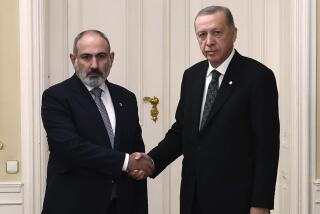Syrian government submits plan for truce, prisoner swap
BEIRUT -- The Syrian government Friday said it had presented plans to its Russian allies for a cease-fire in the northern city of Aleppo and an exchange of prisoners with the opposition in advance of peace talks next week in Switzerland.
The announcement in Moscow by Walid Moallem, the Syrian foreign minister, appeared to be a significant development in advance of possibly landmark peace talks slated to begin Wednesday in the Swiss city of Montreux.
The proposals would also seem to put the government of President Bashar Assad, whom the opposition has been fighting to topple, at the center of the cease-fire plan.
U.S. Secretary of State John F. Kerry and his Russian counterpart, Sergei Lavrov, this week called on both sides in the protracted conflict to work toward a limited cease-fire, a prisoner exchange and improved access for humanitarian aid in advance of next week’s meeting.
On Friday, the Syrian government also said it was willing to step up efforts to bolster the delivery of humanitarian assistance, but blamed rebels for opening fire earlier this week on an aid convoy destined for needy civilians trapped in the besieged southern Damascus district of Yarmouk.
The Syrian government’s new proposal, in coordination with its Russian ally, would seem to be an effort by Damascus and its international supporters to take the initiative in the run-up to next week’s long-anticipated talks, strongly endorsed by Washington and Moscow. The Switzerland session would be the first time that Syrian government officials have met with representatives of the exile-based opposition coalition supported by the United States and its allies.
The Syrian offer, made at a joint news conference in Moscow by the foreign ministers of Syria and Russia, would seem to put the onus on the U.S.-backed opposition to respond. But the opposition is deeply fragmented and divided about how to proceed at what appears to be a critical juncture in the conflict.
The main, U.S.-backed opposition umbrella group, the Syrian National Coalition, was meeting in Istanbul on Friday and was expected to decide whether it will attend the peace talks. U.S. officials have strongly urged the group to take part. On Thursday, Kerry called an impromptu news conference in Washington intended in part to persuade the coalition to send representatives to the Switzerland talks.
But the prospect of face-to-face negotiations with the Syrian administration has put the exile-based political opposition in a deep quandary. Many rebel commanders on the ground in Syria have denounced the talks as a sellout to Assad’s government. The exile-based opposition, already assailed by many rebel forces on the ground as ineffective, faces additional criticism from rebel groups if it goes to Geneva.
The Syrian government says it will attend the talks. But Damascus has insisted that Assad will not agree to resign -- and may even consider running for reelection this year. The U.S.-backed opposition coalition has demanded that any peace talks lead to Assad’s removal from office. This fundamental dilemma about Assad’s future remains unresolved as the date for the scheduled talks nears.
Details about any possible cease-fire in Aleppo were not immediately available, but Moallem, the Syrian foreign minister, indicated that Moscow would play a role in coordinating the plan with the United States and other nations backing the opposition.
Previous efforts to impose cease-fires have failed during the almost three years of civil war in Syria, where more than 100,000 people have been killed in the fighting. The war has spread instability throughout the region, sent millions of refugees streaming across Syria’s borders and created a humanitarian catastrophe inside the strategically situated nation, which borders Israel, Iraq, Turkey, Lebanon and Jordan. Syria has also become a focus for Al Qaeda-linked terror factions.
The northern city of Aleppo, once Syria’s commercial hub, has been split between government and opposition forces for 18 months. In recent weeks, the city has also been the site of intense infighting between various rebel groups with different agendas for a future Syria. How a cease-fire would be achieved in the embattled city was not clear, but Moallem spoke in Moscow of a “zero hour” in which hostilities could cease, presumably before the talks in Switzerland are set to begin.
In addition, Moallem said Damascus was willing to exchange lists of detainees with the opposition for a possible prisoner swap. The Syrian opposition has demanded a release of all detainees.
There was no immediate response from the Syrian opposition to the latest government proposals.
Twitter: @mcdneville
More to Read
Sign up for Essential California
The most important California stories and recommendations in your inbox every morning.
You may occasionally receive promotional content from the Los Angeles Times.








